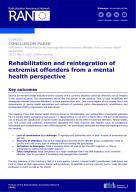Details
- Publication date
- 10 September 2021
- Author
- Directorate-General for Migration and Home Affairs
- RAN Publications Topic
- Mental health issues
Description
Several EU Member States indicate that the majority of the currently detained extremist offenders will be released in the upcoming years. This development shows that the answer to the question “how to best rehabilitate and reintegrate released extremist offenders” is more pressing than ever. One crucial aspect of this answer lies in the incorporation of mental health approaches and methods of treatment within disengagement, rehabilitation and reintegration (DRR) programmes and approaches.
This meeting of the RAN Mental Health Working Group on ‘Rehabilitation and reintegration of extremist offenders from a mental health perspective’ took place in a digital setting on 10 and 11 March 2021.
The aim of the meeting was to discuss the significance of mental health issues/disorders for the DRR of extremist offenders. Mental health, exit, and prison and probation practitioners discussed the most practical and feasible ways to successfully incorporate such considerations in their DRR trajectories. The participants addressed the following challenges during the meeting:
- Lack of coordination is a challenge. If agencies and authorities work in silos, a sense of ownership can get lost.
- Diversity of offenders. Due to the (ideological) diversity of the offender group, practitioners need to quickly work with every type of offender without knowing the specificities.
- Motivation to disengage. What if someone does not wish to join the DRR trajectory or has no willingness to receive mental health support?
- False compliance. False compliance is a major challenge within the DRR trajectory of an extremist offender. How do you know if something has changed their mindset?
One key takeaway of the meeting is that in a multi-agency context, (mental health) practitioners need space and time to reflect on their approaches, clients and procedures, to establish a common ground, and to “keep the other profession in mind” as well as the clients.
This paper summarises the discussion and recommendations on the role of mental health practitioners in DRR. This entails the differences between offenders and extremist offenders and the methods, approaches and therapy that have proven or were discussed as useful to other practitioners. The highlights of the discussion are followed by clear and to-the-point recommendations for all those involved in the DRR of extremist offenders and pay particular attention to mental health considerations. Lastly, the follow-up and inspiring practices are outlined.

